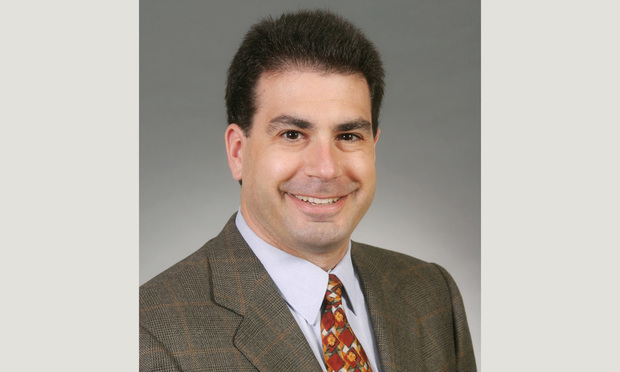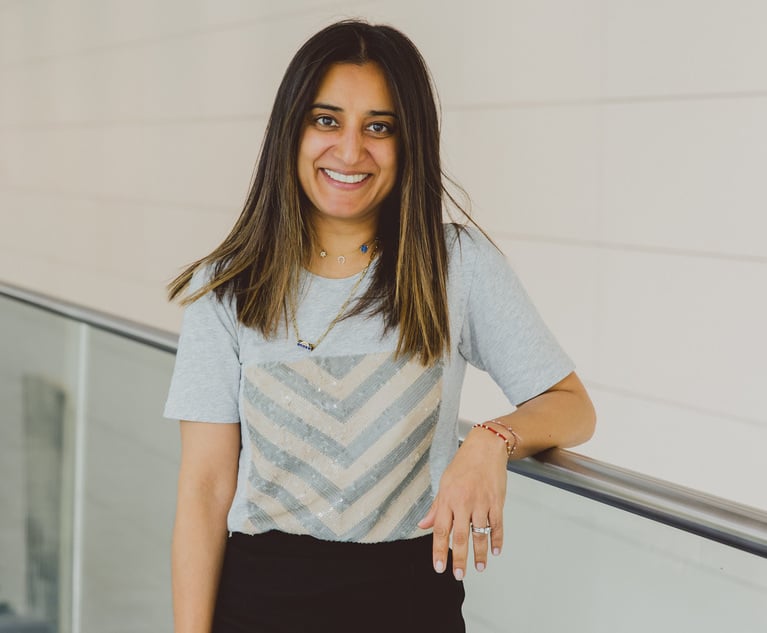Juniper Gets Double Trial Win in Cybersecurity Spat With Finjan
Irell persuaded Judge William Alsup to block Finjan from seeking $60 million in damages and got the jury to find the patent claim was not infringed.
December 17, 2018 at 06:46 PM
3 minute read
 Jonathan Kagan, with Irell & Manella.
Jonathan Kagan, with Irell & Manella.Juniper Networks Inc. has prevailed in a jury trial on a patent infringement claim that cybersecurity company Finjan Inc. had valued at $60-70 million.
An Irell & Manella team led by partner Jonathan Kagan persuaded U.S. District Judge William Alsup of the Northern District of California to exclude all of Finjan's damages evidence. Jurors then found Dec. 14 that Juniper's cloud-based scanning systems did not infringe claim 10 on Finjan's patent on a malware runtime monitoring system.
Finjan has a track record of decent success in the Bay Area. It won a $39.5 million verdict against Blue Coat Systems in 2015—later settled following a reduction in damages on appeal—and a $15 million verdict against Sophos Inc. in 2016 that featured the same 8,777,494 patent from last week's trial. Finjan states on its website that it has generated more than $350 million from licensing its IP.
“We're disappointed, but not discouraged,” Finjan Chief Intellectual Property Office Julie Mar-Spinola said Monday afternoon. She noted that post-trial motions lay ahead, and that Finjan is asserting other claims against Juniper that have yet to be tried.
Juniper and Irell had argued that the accused product, a cloud-based malware protection service called Sky ATP that's offered as an add-on to Juniper's SRX Gateways, generated only $1.8 million in revenues during the damages period. “The notion that Juniper would have agreed to pay Finjan $60-$70 million on sales of $1.8 million defies basic laws of economics,” Juniper argued in a motion signed by Irell partner Rebecca Carson.
Irell argued that Finjan's expert, Kevin Arst, had improperly calculated damages based on all SRX gateways, whether enabled with Sky ATP or not, and on related cost savings.
Alsup apparently agreed—he excluded Arst's testimony, though his reasoning is under seal. Although he stated throughout the proceedings that experts aren't necessary in his view to prove damages, he ultimately excluded lay testimony from Finjan executives as to the patent's licensing value.
Along with Kagan and Carson, Juniper's team included partner Alan Heinrich and associates Josh Glucoft, Casey Curran, Sharon Song and Kevin Wang. Finjan was represented by regular outside counsel at Kramer Levin Naftalis & Frankel.
The case was tried under Alsup's “shootout” format, in which he instructs the plaintiff to assert what it considers its strongest claim and the defendant to attack the weakest. The idea is to develop guidance for the parties on the value of all the asserted claims while educating Alsup about the patents. In many cases both claims get decided on summary judgment. Alsup did grant summary judgment of non-infringement on Juniper's chosen claim, but found factual issues that had to be submitted to a jury on Finjan's claim.
Finjan v. Juniper Networks had drawn attention on the IP blog Patently-O because Alsup had indicated he would submit part of Juniper's claim that the patent is ineligible under Section 101 to the jury. But the parties subsequently stipulated that Alsup could decide patent eligibility after trial. Given the outcome on damages and non-infringement, it's not clear if Alsup will rule on eligibility.
This content has been archived. It is available through our partners, LexisNexis® and Bloomberg Law.
To view this content, please continue to their sites.
Not a Lexis Subscriber?
Subscribe Now
Not a Bloomberg Law Subscriber?
Subscribe Now
NOT FOR REPRINT
© 2025 ALM Global, LLC, All Rights Reserved. Request academic re-use from www.copyright.com. All other uses, submit a request to [email protected]. For more information visit Asset & Logo Licensing.
You Might Like
View All
Eight Years On, A&O Shearman’s Fuse Legal Tech Incubator Is Still Evolving
4 minute read


Meta Workers Aren't of One Mind on Company's Retreat From DEI, Fact-Checking
Trending Stories
- 1Big Law Firms Sheppard Mullin, Morgan Lewis and Baker Botts Add Partners in Houston
- 2Lack of Jurisdiction Dooms Child Sex Abuse Claim Against Archdiocese of Philadelphia, says NJ Supreme Court
- 3DC Lawsuits Seek to Prevent Mass Firings and Public Naming of FBI Agents
- 4Growth of California Firms Exceeded Expectations, Survey of Managing Partners Says
- 5Blank Rome Adds Life Sciences Trio From Reed Smith
Who Got The Work
J. Brugh Lower of Gibbons has entered an appearance for industrial equipment supplier Devco Corporation in a pending trademark infringement lawsuit. The suit, accusing the defendant of selling knock-off Graco products, was filed Dec. 18 in New Jersey District Court by Rivkin Radler on behalf of Graco Inc. and Graco Minnesota. The case, assigned to U.S. District Judge Zahid N. Quraishi, is 3:24-cv-11294, Graco Inc. et al v. Devco Corporation.
Who Got The Work
Rebecca Maller-Stein and Kent A. Yalowitz of Arnold & Porter Kaye Scholer have entered their appearances for Hanaco Venture Capital and its executives, Lior Prosor and David Frankel, in a pending securities lawsuit. The action, filed on Dec. 24 in New York Southern District Court by Zell, Aron & Co. on behalf of Goldeneye Advisors, accuses the defendants of negligently and fraudulently managing the plaintiff's $1 million investment. The case, assigned to U.S. District Judge Vernon S. Broderick, is 1:24-cv-09918, Goldeneye Advisors, LLC v. Hanaco Venture Capital, Ltd. et al.
Who Got The Work
Attorneys from A&O Shearman has stepped in as defense counsel for Toronto-Dominion Bank and other defendants in a pending securities class action. The suit, filed Dec. 11 in New York Southern District Court by Bleichmar Fonti & Auld, accuses the defendants of concealing the bank's 'pervasive' deficiencies in regards to its compliance with the Bank Secrecy Act and the quality of its anti-money laundering controls. The case, assigned to U.S. District Judge Arun Subramanian, is 1:24-cv-09445, Gonzalez v. The Toronto-Dominion Bank et al.
Who Got The Work
Crown Castle International, a Pennsylvania company providing shared communications infrastructure, has turned to Luke D. Wolf of Gordon Rees Scully Mansukhani to fend off a pending breach-of-contract lawsuit. The court action, filed Nov. 25 in Michigan Eastern District Court by Hooper Hathaway PC on behalf of The Town Residences LLC, accuses Crown Castle of failing to transfer approximately $30,000 in utility payments from T-Mobile in breach of a roof-top lease and assignment agreement. The case, assigned to U.S. District Judge Susan K. Declercq, is 2:24-cv-13131, The Town Residences LLC v. T-Mobile US, Inc. et al.
Who Got The Work
Wilfred P. Coronato and Daniel M. Schwartz of McCarter & English have stepped in as defense counsel to Electrolux Home Products Inc. in a pending product liability lawsuit. The court action, filed Nov. 26 in New York Eastern District Court by Poulos Lopiccolo PC and Nagel Rice LLP on behalf of David Stern, alleges that the defendant's refrigerators’ drawers and shelving repeatedly break and fall apart within months after purchase. The case, assigned to U.S. District Judge Joan M. Azrack, is 2:24-cv-08204, Stern v. Electrolux Home Products, Inc.
Featured Firms
Law Offices of Gary Martin Hays & Associates, P.C.
(470) 294-1674
Law Offices of Mark E. Salomone
(857) 444-6468
Smith & Hassler
(713) 739-1250






